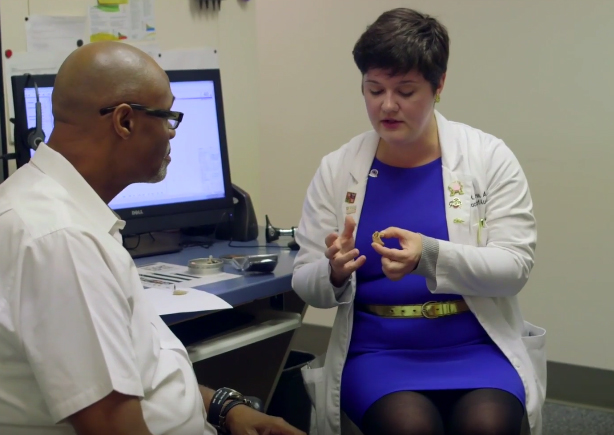
Once you have selected your hearing aids after an evaluation, our hearing professional will program them to meet your hearing needs, based on a prescription. The hearing professional will explain how to use the device, how to put it in the ear and how to remove it, how to change batteries and how to care for and clean the device. It is also a good idea to bring family members or close friends to the hearing aid fitting so they can help remember all the information that is given and be a support to you.
When you put the hearing aids in for the first time, you may have different emotions about the sounds you hear. All of these feelings are normal and to be expected. The goal of the hearing aid is to make everyday sounds audible and comfortable. Small changes can be made to the hearing aid at your first fitting if there are things that you feel should be adjusted right away. The hearing professional may do some testing to make sure the hearing aids are giving you enough sound where you need it.
You may be also be given a short survey or list of questions to answer. Be honest about what you hear so that the hearing professional can work with you to create the best listening experience with your new hearing aids. Your hearing aid fitting is only a starting place; other changes to customize the hearing to your liking may need to take place at another appointment. However, changes cannot be made unless you tell someone!
Attitude is the key to the hearing aid user's success. Hearing aid studies have shown that people who have a positive attitude do better with hearing aids. If you, as well as your spouse or family, approach your hearing aid fitting with a positive outlook, knowing that it may take some time to get used to the sounds you were missing, you will have a much better listening experience more quickly.
Hearing Aid Repair
Hearing aids have small working parts, and it is not uncommon over time for a hearing aid to need a repair. You may try to turn the hearing aid on in the morning and find that there is no sound; the battery door may come unhinged. These things do happen, even when the hearing aids are properly cared for. If you should experience an issue that needs repair, take the hearing aid(s) to your hearing care professional. They are equipped to diagnose broken hearing aids. Some minor hearing aid repairs can be done in the office setting in a short period of time; others will need to be sent to the manufacturer for repair. Your hearing professional can help determine what kind of a repair is necessary if you feel your hearing aid is not working properly.
If you are a current patient and have hearing aids that were not fit in our office, we are happy to try to repair your hearing aids. We are able to service most major manufacturers of hearing aids and can tell you in the office if yours is a brand we service. Hearing aids come with a warranty when purchased new. If your warranty has expired, it is still possible to repair most hearing aids with a small fee. Depending on the hearing aid manufacturer, this repair may come with a new year-long warranty. Your hearing professional will provide you with details when you take your hearing aid into the office.
